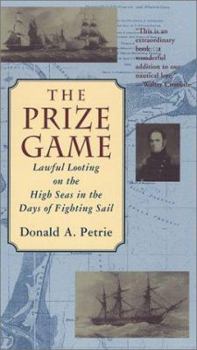The Prize Game: Lawful Looting on the High Seas in the Days of Fighting
Select Format
Select Condition 
Book Overview
This collection of rollicking sea tales vividly explains the doctrine and practice of maritime prize taking. This description may be from another edition of this product.
Format:Mass Market Paperback
Language:English
ISBN:0425178293
ISBN13:9780425178294
Release Date:July 2001
Publisher:Berkley Publishing Group
Length:240 Pages
Weight:1.14 lbs.
Dimensions:0.7" x 4.5" x 8.1"
Customer Reviews
4 ratings
Yo, Ho, Ho and a bag of Affidavits
Published by Thriftbooks.com User , 15 years ago
What is the relationship between lawyers and marauders? Well nowadays someone would end that with a witty punch line. But at one time they did work closely together. This is a book relating to the laws and customs of war in the age of sail especially with regard to the taking of prizes. It gives fascinating details, such as cross ocean lawsuits after hostilities(at one time their was a suit by an American privateer in a British court over the validity of a ransom promised to him), the issueing of letters of mark, and the condemnation of prey in prize courts. As might be expected in a book about legal matters it can have dry writting at times. But it also has interesting anecdotes and a great deal of information about a specialized aspect of war on the high seas.
Informative book
Published by Thriftbooks.com User , 18 years ago
I found Donald A. Petrie's book to be very informative on how captured ships during the times of wooden ships and iron men era was dealt with. The time period in question lies between 1776 to 1815 although the book does covered some element of the American Civil War as well. The rules of taking ships during the time of war proves to be a highly complex affair as each nation seem to have their own rules andlaws. But on the whole, they generally followed the lead of the British navy since the British navy ruled the waves. The book proves to be well written, well researched and the author takes pains to explained how it worked. He gaves example cases to reflect his points. He shows the difference between a legal privateer and an illegal pirate, how a ship can be "ransomed" on sea and how such claims can be held as legal debt even after the war. The author make pains to explained how a privateer have certain set of rules which govern his actions, rules that clearly separate him from a common pirate. For any readers interested in naval history, this book should be a welcome source of knowledge. For anyone who's a fan of Hornblower, Aubrey, Bothilo and Rampage, this book will explained much.
Government-Sponsored Piracy - Glorious Too
Published by Thriftbooks.com User , 22 years ago
A neat little book on legal niceties of the sea anwering all your questions about Prize, that strange doctrine of international law dealing with the rewards for capturing enemy vessels at sea . Legal mysteries solved by this book include: whether an eighteenth-century admiralty court in Britain might treat an English-speaking privateer as a traitor, whether an American revolutionary might lawfully seize a British merchantman off the Norwegian coast, how many days' notice are required before a port's trade with neutral vessels can be blockaded; whether a seized Confederate vessel counts as prize in a Union court and whether modern sailors still have the right to share the spoils of an enemy vessel. Sterling stuff.
The Prize Game by Donald A. Petrie
Published by Thriftbooks.com User , 23 years ago
This book is a good resource for history buffs or anyone who's been drawn into the world of historical nautical fiction created by the likes of Patrick O'Brian or C.S. Forester. 'Prizes' were vessels of a rival nation captured by naval warships and privateers (private vessels operating under letters of marque and reprisal from their government). The taking and disposition of prizes were strictly 'regulated' by international law. The author: seaman, soldier, lawyer, businessman, politician and publisher, gives a good overview of the intricacies of prizes during the age of sail. He uses several case studies to discuss the practice of ransoming vessels, sea cartels, the distinction between piracy and privateering, prize courts, blockades, and the rights and responsibilities of everybody involved in the taking of prizes at sea. He concludes with a chapter that summarizes the rules of the prize game. His discussion focuses mostly on American actions during the period from the Revolutionary to Civil War, but that discussion invariably involves U.S. relations and interactions with England, France, Denmark and Norway. While the narrative lacked the excitement of the chase and capture that I find so addictive in Horatio Hornblower, it provided a historical foundation to make Hornblower's exploits that much more enjoyable. The work is well annotated for those wanting to dig deeper into the history or law of the naval prize.





